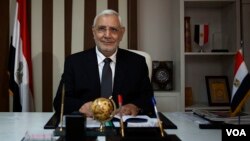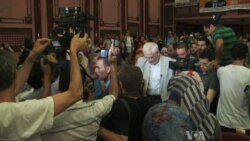CAIRO —
Egyptian Field Marshal Abdel Fattah el-Sissi is widely expected to become the country's next president, drawing on support from voters tired of upheaval and domestic media that almost uniformly sing his praises. Now, it seems inevitable that another military figure might become president.
The space for political dialogue in Egypt is taken up very much by one man. Field Marshal Abdel Fatah al-Sissi dominates the landscape and, though he has yet to declare his candidacy, his supporters call him the nation's only hope.
Squeezed to the sidelines, Strong Egypt Party founder Aboul Moneim Aboul Fatouh finds that sense of all or nothing is at the heart of what is wrong with the country, three years after a popular uprising.
He says Egypt had a revolution and offered up martyrs for the sake of having real elections.
Aboul Fatouh believes the current military-installed government has made “real elections” impossible.
He argues that in the name of fighting terrorism, the government is oppressing political opposition. What is needed, he says, is dialogue among all sides.
Inclusiveness is something Aboul Fatouh says he tried in the 2012 election. A former Muslim Brotherhood leader, he presented himself as a moderate independent, attracting everyone from students and housewives to ultraconservative Salafists, all while boasting an unveiled, Marxist woman as a political advisor.
He saw no such inclusion in the presidency of the race's victor, former Brotherhood colleague Mohamed Morsi. Aboul Fatouh was among those who last year called for early elections. But he rejected the military's forcing Morsi out.
He says the military claimed it acted to prevent a civil war, but only succeeded in bringing one about, with killings, ongoing conflict and deepening polarization.
Some see the problem as a lack of seasoned politicians to face up to the problems. Aboul Fatouh, for example, is an accomplished physician, but in the last campaign lacked what many felt was a credible economic plan.
Political analyst Hisham Kassem, who thinks Aboul Fatouh would only gain single digit support, also finds fault with a public - even one which overthrew long-serving autocrat Hosni Mubarak -- sadly comfortable with strongman leadership.
“In an authoritarian rule, you are always stuck with a lot of hypocrites, okay," he said. "And if Sissi tomorrow decides I am not running, they are going to look for the runner up and move their guns [support] there.”
If so, they may have options. Retired Armed Forces Chief of Staff Sami Annan has made plans to enter the race.
Aboul Fatouh blames not just military figures, but also the stubbornness of Egypt's other political parties.
He says politicians lack experience in the art of dialogue, acceptance, of gaining something and losing something else - the very nature of democratic politics.
Even this potential bridge candidate has given up on the possibility of give-and-take in a country he now calls a 'republic of fear.' Aboul Fatouh is refusing to run.
The space for political dialogue in Egypt is taken up very much by one man. Field Marshal Abdel Fatah al-Sissi dominates the landscape and, though he has yet to declare his candidacy, his supporters call him the nation's only hope.
Squeezed to the sidelines, Strong Egypt Party founder Aboul Moneim Aboul Fatouh finds that sense of all or nothing is at the heart of what is wrong with the country, three years after a popular uprising.
He says Egypt had a revolution and offered up martyrs for the sake of having real elections.
Aboul Fatouh believes the current military-installed government has made “real elections” impossible.
He argues that in the name of fighting terrorism, the government is oppressing political opposition. What is needed, he says, is dialogue among all sides.
Inclusiveness is something Aboul Fatouh says he tried in the 2012 election. A former Muslim Brotherhood leader, he presented himself as a moderate independent, attracting everyone from students and housewives to ultraconservative Salafists, all while boasting an unveiled, Marxist woman as a political advisor.
He saw no such inclusion in the presidency of the race's victor, former Brotherhood colleague Mohamed Morsi. Aboul Fatouh was among those who last year called for early elections. But he rejected the military's forcing Morsi out.
He says the military claimed it acted to prevent a civil war, but only succeeded in bringing one about, with killings, ongoing conflict and deepening polarization.
Some see the problem as a lack of seasoned politicians to face up to the problems. Aboul Fatouh, for example, is an accomplished physician, but in the last campaign lacked what many felt was a credible economic plan.
Political analyst Hisham Kassem, who thinks Aboul Fatouh would only gain single digit support, also finds fault with a public - even one which overthrew long-serving autocrat Hosni Mubarak -- sadly comfortable with strongman leadership.
“In an authoritarian rule, you are always stuck with a lot of hypocrites, okay," he said. "And if Sissi tomorrow decides I am not running, they are going to look for the runner up and move their guns [support] there.”
If so, they may have options. Retired Armed Forces Chief of Staff Sami Annan has made plans to enter the race.
Aboul Fatouh blames not just military figures, but also the stubbornness of Egypt's other political parties.
He says politicians lack experience in the art of dialogue, acceptance, of gaining something and losing something else - the very nature of democratic politics.
Even this potential bridge candidate has given up on the possibility of give-and-take in a country he now calls a 'republic of fear.' Aboul Fatouh is refusing to run.






